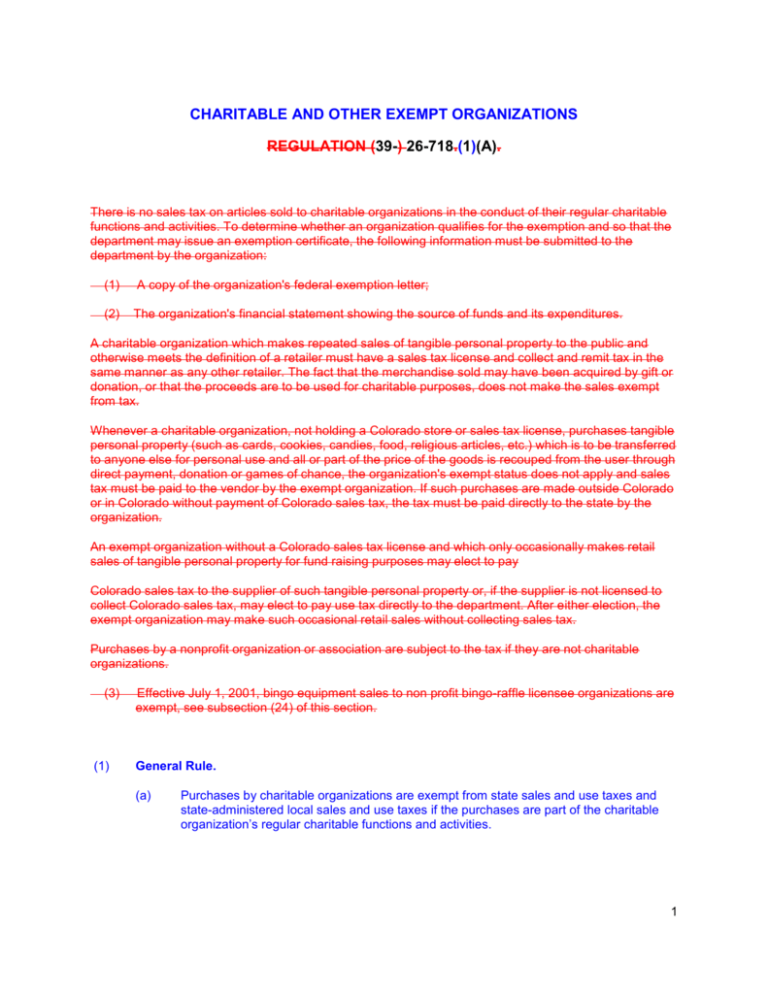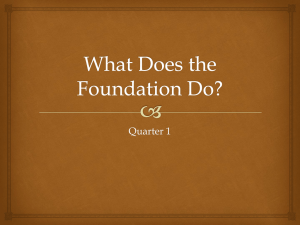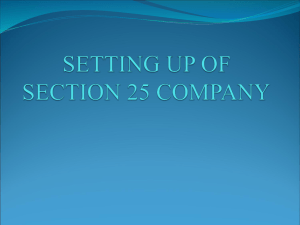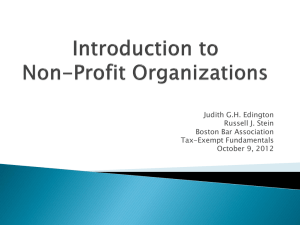CCR Template - Colorado Secretary of State
advertisement

CHARITABLE AND OTHER EXEMPT ORGANIZATIONS REGULATION (39-) 26-718.(1)(A). There is no sales tax on articles sold to charitable organizations in the conduct of their regular charitable functions and activities. To determine whether an organization qualifies for the exemption and so that the department may issue an exemption certificate, the following information must be submitted to the department by the organization: (1) A copy of the organization's federal exemption letter; (2) The organization's financial statement showing the source of funds and its expenditures. A charitable organization which makes repeated sales of tangible personal property to the public and otherwise meets the definition of a retailer must have a sales tax license and collect and remit tax in the same manner as any other retailer. The fact that the merchandise sold may have been acquired by gift or donation, or that the proceeds are to be used for charitable purposes, does not make the sales exempt from tax. Whenever a charitable organization, not holding a Colorado store or sales tax license, purchases tangible personal property (such as cards, cookies, candies, food, religious articles, etc.) which is to be transferred to anyone else for personal use and all or part of the price of the goods is recouped from the user through direct payment, donation or games of chance, the organization's exempt status does not apply and sales tax must be paid to the vendor by the exempt organization. If such purchases are made outside Colorado or in Colorado without payment of Colorado sales tax, the tax must be paid directly to the state by the organization. An exempt organization without a Colorado sales tax license and which only occasionally makes retail sales of tangible personal property for fund raising purposes may elect to pay Colorado sales tax to the supplier of such tangible personal property or, if the supplier is not licensed to collect Colorado sales tax, may elect to pay use tax directly to the department. After either election, the exempt organization may make such occasional retail sales without collecting sales tax. Purchases by a nonprofit organization or association are subject to the tax if they are not charitable organizations. (3) (1) Effective July 1, 2001, bingo equipment sales to non profit bingo-raffle licensee organizations are exempt, see subsection (24) of this section. General Rule. (a) Purchases by charitable organizations are exempt from state sales and use taxes and state-administered local sales and use taxes if the purchases are part of the charitable organization’s regular charitable functions and activities. 1 (2) (b) Sales by charitable organizations generally are not exempt from sales tax, except for occasional sales, sales where a portion of the purchase price is a donation, and sales by certain school-related entities. (c) The following are common situations where the acquisition of property by a charitable organization is not subject to sales tax. (i) The charitable organization does not pay the donor for the donation (sales tax does not apply to transactions when consideration is not paid), or (ii) The purchase was part of its regular charitable function and activity, or (iii) The purchase was made with the intention of reselling the item at a fundraising event, in which case the charitable organization’s purchase is exempt as a wholesale purchase for resale. Types of Charitable Organizations. (a) (b) Charitable organizations must operate exclusively for one or more of the following purposes or functions: (i) Religious; (ii) Charitable; (iii) Scientific; (iv) Literary; (v) Educational; (vi) Testing for public safety; (vii) Fostering national or international amateur sports competition, as long as no part of its activities involves providing athletic facilities or equipment; (viii) Preventing cruelty to children or animals; or (ix) Sponsoring a special event, meeting or other function in the State of Colorado by any veterans’ organization registered under section 501(c)(19) of the Internal Revenue Code of 1986, so long as such event, meeting or function is not part of such organization’s regular activities in the state. IRS 501(c)(3) Certificates. A charitable organization that holds a 501(c)(3) determination letter from the Internal Revenue Service is provisionally presumed to qualify as a charitable organization that is exempt from Colorado sales and use tax. However, the Department is not bound by an IRS determination of an organization’s charitable status, and the Department may independently evaluate whether the entity qualifies as a charitable entity. The IRS does not require religious organizations, such as churches or synagogues, to apply for a 501(c)(3) determination letter in order to qualify as a taxexempt charitable organization. In such cases, the Department will issue a sales tax exemption certificate to a religious charitable entity, even in absence of an 501(c)(3) determination letter, if the organization has a religious purpose and meets the conditions set forth below. 2 (c) (3) Nonprofit Organizations. An organization that is a nonprofit or an organization that performs some charitable services or provides funding to a qualified charitable organization does not automatically qualify as a charitable organization for sales and use tax purposes. In order to qualify, the organization must be established and operated exclusively for one or more of the charitable purposes listed above. Examples of organizations that do not qualify as a charitable organization for purposes of this exemption are nonprofit country clubs, private clubs, employees or social clubs or organizations, nonprofit recreational organizations, lodges, patriotic organizations (veteran organizations have a limited exemption, discussed below), fraternities, sororities, professional and trade associations, civic organizations, labor unions, political organizations, and other nonprofit entities. Application for Exemption Certificates. (a) Applicants must submit a completed application for a sales tax exemption certificate and include a copy of the organization's federal 501(c)(3) determination. (i) If the charitable organization is a religious organization, then it shall provide, in lieu of the certificate, a copy of its IRS determination letter of its status as a charitable organization. (A) (ii) (4) If the applicant is a religious organization that is an affiliate of a national organization that holds a Colorado exemption certificate, applicant may submit, in lieu of such a determination letter, documentation from the national organization demonstrating that applicant is an affiliate of such organization. Notwithstanding a determination by the IRS of an applicant’s charitable status, the Department may conduct, either before or after the issuance of a exemption certificate, an independent review of whether the organization qualifies as a charitable organization. Restrictions on Charitable Organization Activities. (a) Exclusively. An organization will be regarded as operating exclusively for one or more exempt purpose only if the organization exclusively engages in activities in furtherance of its exempt purpose. A charitable organization will not lose its exempt charitable status if its non-charitable activities are insubstantial. (i) Examples. (A) A religious bookstore operated by and located in a church, synagogue, or other place of worship that is marketed exclusively to its members or to visitors of the religious establishment is considered part of the regular function and activities of the organization’s charitable purpose. However, if the religious organization operates a restaurant or coffee shop for the public unrelated to its charitable propose, then the organization does not qualify for the exemption because this activity is not considered part of the organization’s charitable function. Note that this exemption applies only to purchases by exempt organizations and does not apply to sales made by the organization (except as discussed below). For example, sales by a church in a coffee shop operated on church property are subject to sales tax even if the revenues from such sales are insubstantial, unless the sales qualify under the occasional sale exemption or the donation exemption, discussed below. 3 (B) (b) (5) Providing meals to the poor or homeless for free or below cost is generally considered a charitable activity. Other Restrictions. A charitable organization is subject to the following limitations in order to qualify for the sales and use tax exemption certificate: (i) No part of an organization’s net earnings can benefit any private shareholder or individual. A mutual benefit society is an organization whose benefits are available only to its members and/or their beneficiaries and requires payment by its members as a condition to receiving such benefits. A mutual benefit society is not organized for a charitable purpose, and is not a charitable organization exempt from sales and use taxes under this exemption. (ii) No substantial part of an organization’s activities can be carrying-on propaganda or otherwise attempting to influence legislation. For example, an organization whose main activity is prevention of cruelty to animals is not a charitable organization for sales and use tax purposes if a substantial portion of the organization's activities involves dissemination of propaganda that is favorable to its political objectives or consists of lobbying for legislation that supports the organization's activities and mission. (ii) An organization may not participate in, or intervene in, a political campaign on behalf of any candidate for public office (including the publishing or distributing of statements). Purchases by Charitable Organizations. (a) Purchases by charitable organizations are exempt from sales and use taxes if the goods or services are used exclusively in the conduct of the charitable organization’s regular charitable functions and activities. Purchases must be made directly from the organization’s funds and, for purchases over one-hundred dollars, must be made with a check or credit card issued in the organization’s name. Purchases made with funds other than the organization’s own funds or purchases made with a charitable organization’s funds but reimbursed by someone who is not a qualified charitable organization are not exempt from sales or use tax. (i) (b) Examples. (A) A purchase on behalf of a charitable organization made with a credit card in the name of an individual is not exempt. (B) An educational charitable organization’s purchase of computers is not exempt if the computers are given to members of the organization who use the computers for their own personal use or who reimburse the organization. (C) An educational institution’s purchase of athletic equipment or uniforms is not exempt from sales and use tax if the educational institution is reimbursed for the equipment or uniforms from students or their families. Veteran’s Organizations. Purchases by veteran’s organizations that are registered under section 501(c)(19) of the Internal Revenue Code of 1986 are exempt only if the goods are used for a special event, meeting, or other function that is not part of the organization's regular activities. The Department does not issue an exemption certificate to veteran’s 4 organizations. Instead, veteran’s organizations must apply for a special event license for each special event or function. Veteran’s organizations make exempt purchases by presenting the special events license to the vendor. Sales by veteran’s organizations are not exempt from sales tax. (6) (7) Donor’s Obligation for Sales and Use Tax. (a) A donor who purchases tangible personal property for the purpose of donating it to a charity must pay sales or use tax on the purchase and cannot claim the charitable organization’s exemption. The donor cannot claim a sale for resale exemption because the property is donated, not resold, to the charitable organization. (b) A retailer who initially makes a wholesale (exempt) purchase of an item for resale (e.g., retailer buys an item for its inventory it plans to resale) and later withdraws that item from inventory and donates it to a charitable organization incurs use tax on the withdrawal from inventory. However, see the cross reference (5) for information on the exemption for donations of manufactured goods by manufacturers. Sales by Charitable Organization. (a) General Rule. Sales made by charitable organizations are generally not exempt from sales tax, unless the sale qualifies for the occasional sale exemption, as a donation, or any other applicable exemption that may apply. For example, a charitable organization that operates a gift or book shop, rummage store, or coffee shop must collect sales tax on sales. (b) Occasional Sale Exemption. Occasional sales of taxable tangible personal property by a charitable organization that holds a Colorado exemption certificate are exempt from sales and use taxes. An occasional sale must meet the following criteria: (i) The charitable organization conducts sales for a total of twelve days or less during a calendar year, and (A) (ii) Each day a sale occurs is counted as an entire day, even if the sale occurs for less than a full day or the organization characterizes a multiday sale as one event. The “net proceeds” from all these events do not exceed twenty-five thousand dollars in that calendar year. “Net proceeds” means the total gross receipt(s) minus expenses directly attributable to the event(s). (A) “Directly attributable” generally means those expenses that would not have arisen but for the occurrence of the event and do not include indirect and overhead costs, such as administrative staff wages, insurance unless purchased for the specific event, rent otherwise due even if no event was held, property taxes, and other expenses that would be incurred even in the absence of the event. (B) Payment by the charitable organization to acquire any goods that are later sold at a fundraising event is an expense that is deducted from the gross proceeds to determine net proceeds. (C) When a charitable organization exceeds either threshold described in paragraph (7)(b)(i)or (ii), then all sales that occur in that calendar year 5 are subject to tax, including sales in that calendar year that were previously exempt prior to the date when the threshold was exceeded. Sales tax applies to the gross proceeds, not the net proceeds. The charitable organization must have a sales tax license if and when either of these limits is exceeded. (I) Example 1. Charitable organization conducts one auction sale which generates $30,000 in gross proceeds and $20,000 in net proceeds. Because neither threshold was exceeded, the charitable organization does not collect, report, or remit sales tax. (II) Example 2. Same facts as Example No. 1, but net proceeds are $26,000. Charitable organization has exceeded the $25,000 threshold, and, therefore, must collect, report, and remit sales tax on the gross proceeds of $30,000. (iii) The funds retained by the charitable organization are used in the course of the organization’s charitable service. (iv) Living accommodations and other taxable services. The exemption for occasional sales applies only to the sale of tangible personal property. Therefore, sales of taxable services by a charitable organization are subject to tax. For example, a charitable organization conducts a silent auction at which it auctions a weekend rental of a timeshare or hotel room. The sale of living accommodations is a sale of a service. The sale is subject to state and local sales taxes applicable to where the accommodation is located even if the charitable organization has not exceeded the twelve day or twenty-five thousand dollar thresholds. The sale of the living accommodation is not included in the calculation of the twenty-five thousand dollar threshold. (A) If the auction is not conducted in the same state-administered local jurisdiction in which the living accommodation is located, then the charitable organization must register with the Department for the local jurisdiction where the accommodations is located and collect the local sales taxes, including any lodging or local marketing district taxes, applicable to the rental of living accommodations. (v) Goods sold on consignment. Goods given by a retailer to a charitable organization for sale at a fundraising event with the understanding that the goods will be offered for sale at a minimum price and the minimum price is paid to the retailer, and with the further understanding that the goods would be returned to the retailer if not sold at the event are subject to sales tax on the minimum price even if the twenty-five thousand dollar threshold is not met. For example, a bike shop offers a bike to a charitable organization to be sold at a fundraising auction, but the bike shop requires the charitable organization to pay the bike shop a portion of the purchase price in the event the bike is sold. The charitable organization must collect sales tax from the successful bidder for the payment made to the bike shop, even if the net proceeds from the event do not exceed the twenty-five thousand dollar threshold. (vi) State-Administered Local Tax Jurisdictions. State-administered cities and counties have the option to levy sales tax on occasional sales by charitable organizations. See, §29-2-105(1)(d)(I)(E), C.R.S. However, state-administered special districts, such as the Regional Transportation District, do not have the 6 option to levy sales tax on occasional sales by charitable organizations. Charitable organizations are responsible for collecting state-administered city and county sales taxes for the local jurisdiction in which the sale occurs. If the state-administered city or county elects to tax occasional sales, then the charitable organization must obtain a Colorado sales tax license prior to such sales so that the organization can report and remit the local sales tax to the Department, even though these sales are exempt from Colorado state sales tax. Note that purchases by charitable organizations discussed in paragraph (5) must be exempted by state-administered local tax jurisdictions. Home rule cities are not governed by these rules and procedures and should be contacted directly for more information on their procedures. (c) Donations. A portion of the purchase price for a sale made by a charitable organization may be a donation if the amount paid exceeds the fair market value of the good purchased. (i) The exclusion of donations from the tax base applies even if the charitable organization exceeds the twelve day / twenty-five thousand dollar threshold of the occasional sale exemption. This rule also applies to state-administered local sales taxes even if the local tax jurisdiction elected to tax occasional sales of charitable organizations. (ii) The donation amount is not included in the calculation of the twenty-five thousand dollar net proceeds threshold for the occasional sale exemption. (iii) Examples. (A) Best Buy donates a laptop computer that it sells for $700 at retail. The charitable organization offers the laptop computer at a silent auction and discloses that the fair market value of the laptop computer is $700. The winning bid is $1,000. $300 is a donation not subject to tax. (B) Charitable organization sells 300 tickets for $100 for a dinner and silent auction event. Organization discloses to ticket purchasers that $75 of the $100 ticket price is a donation. Each dinner costs the charitable organization $10. Charitable organization generates $33,000 in silent auction gross sale proceeds ($30,000 derived from the auction of taxable tangible personal property, $1,000 from the auction of non-taxable services and gift certificates, and $2,000 from the auction of taxable vacation rentals), $20,000 in net proceeds from the silent auction, and $4,500 from the sale of dinner (($25-$10) X 300), for a total in net proceeds of $24,500. Because the $75 is a donation and not proceeds from a sale of what would otherwise be taxable goods, the $22,500 ($75 X 300) in donations from ticket sales is not added to the $24,500 in net proceeds to determine whether the $25,000 in net proceeds threshold is exceeded. Sales tax is not due on the net proceeds because the charity has not exceeded the $25,000 threshold. The $1,000 in non-taxable services and gift certificates and the $2,000 in taxable living accommodations are excluded from the net proceeds calculations because the service and cards are not taxable and the living accommodations does not qualify under the occasional sales exemption, which applies only to taxable tangible personal property and not taxable services. 7 (I) (C) (iv) (v) Local Sales Taxes. If the state-administered local tax jurisdiction in which the sale occurred elected not to exempt occasional sales by charitable organizations, then the local tax applies to the gross proceeds from the sale of dinner and auction items, even if the organization did not exceed the $25,000 net proceeds threshold, but local tax does not apply to the $75 because a donation is not subject to state or local sales taxes. Same facts as Example No. 2, except the net proceeds from the auction sale are $23,000. Because the net proceeds threshold is exceeded ($23,000+$4,500), sale tax applies to the gross price, not just the net proceeds, for all dinners ($25 X 300) and to the gross price all of the sales at auction ($30,000 + $2,000). Sales tax is not collected on the $1,000 in the sales of non-taxable services and gift cards and not on the $22,500 in donations. In order to claim a sales tax exemption for a donation included in the buyer’s purchase price, the buyer and charitable organization must establish the following: (A) the fair market value of the taxable item or service, and (B) that the buyer knowingly paid in excess of the fair market value with the intent to donate that excess portion of the price to the charitable organization. The Department will presume that the price paid for an item sold at auction is the item’s fair market value and that the buyer did not knowingly pay in excess of the fair market value. These presumptions can be rebutted by reasonable evidence, such as the price for comparable goods sold by a retailer in its regular course of business and that buyer knew the fair market value of the goods at the time of the purchase. For example, the fair market value of a signed professional sports jersey sold at auction will be presumed to be the price paid by the successful bidder, but the presumption can be rebutted by documentation of the sales price of a comparable signed jersey sold to the public at the professional team’s or other retail store. (A) Examples. (I) A charitable organization holds a fundraising dinner for which patrons purchase a ticket for $100 per person. The organization compiles information that establishes that the fair market value of the dinner is $25 and the cost per meal is $10. The organization establishes that purchasers knowingly paid in excess of the fair market value of the item by disclosing to patrons, at the time tickets are sold, that the fair market value of the dinner is $25 (or that $75 of the $100 purchase price is a donation). State sales tax is due on the $25 if the organization exceeded the $25,000 net proceeds threshold. (II) The fair market value of an item sold at auction is not based on the cost to the organization to acquire the item. For example, a donor may donate a set of golf clubs or a night stay at a condominium to the organization to be auctioned at a fundraising event. The fair market value of the golf clubs or room is not zero 8 even though the organization acquired the golf clubs or room for free. The fair market value is the price at which the item would sell on the open market. (III) (vi) (8) The Department will presume that any donation that qualifies as a donation for federal income tax purposes also qualifies as a donation for sales tax purposes. Parent-Teacher Associations. Sales by parent and teacher associations or organizations are exempt from sales tax if: (a) The association is a charitable organization, and; (b) The sale proceeds are used for the benefit of a public school, an organized public school activity, or to pay reasonable expenses of the association. The exemption does not apply to sales by private schools. However, sales by private schools that qualify as charitable organizations are exempt as occasional sales or are not taxable to the extent the purchase price is a donation, or are exempt pursuant to paragraph 9, below. §39-26718(c), C.R.S. (c) Occasional Sales Restrictions Do Not Apply. This exemption applies even if the sale has exceeded the occasional sale exemption threshold (twelve days / twenty-five thousand dollar as discussed in (7)(b) “Occasional Sale Exemption”). This exemption applies to state-administered local sales taxes even if the local tax jurisdiction elects to tax occasional sales of charitable organizations. See, §29-2-105(1)(d)(I)(E), C.R.S. (i) (9) A charitable organization holds a fundraising auction. The organization previously conducted concession sales and other fundraising sales for twelve days in the same year. The organization compiles information of the fair market value of each of the items sold at auction. The organization establishes that the purchaser knowingly paid in excess of the fair market value of the item by disclosing the fair market value of the auctioned items to potential bidders prior to bidding. The organization does not collect sales tax on that portion of the purchase price that exceeds the fair market value. Example. A public school parent-teacher association can raise funds by selling candy exempt from sales tax in order to purchase school sports uniforms. However, if the parent-teacher association is supporting a private school, its sales are taxable, unless the association is a charitable organization for educational purposes. In addition, if students reimburse the school for the uniforms, then tax must be collected on the amount paid by students. Sales by Public, Private Schools and Supporting Organizations. Sales by public and private schools and supporting organizations are exempt from sales tax if the conditions described in paragraphs (a) to (d) are met. (a) The school is for students in kindergarten through twelfth grade. (b) Preschools, trade schools and post-secondary schools do not qualify. (c) The sale is made by any of the following: (i) the school; 9 (ii) an association or organization of parents and teachers; (iii) booster club or other club, group or organization whose primarily business is to support a school activity; or (iv) a school class, student club, group or organization. These organizations qualify for this exemption even if they are not charitable organizations. Examples include: concession sales by booster club or a silent auction sales conducted by a parent-teacher association or school are exempt if all the proceeds are donated to the school or school-approved student organization (10) (d) All the proceeds from the sale, except the actual cost incurred by a person or entity to acquire the good or service sold, must be donated to the school or school-approved student organization. This exemption does not apply if the entity conducting the sale uses the proceeds for purposes other than to acquire the goods or services, such as for payment facility charges (rent for space, furniture or equipment), labor (wages for security, independent contractors, employees), transportation, meals, insurance, and other costs. Sales by a parent-teacher association that are not exempt under this paragraph (9) may, nevertheless, be as exempt if the sale meets the requirements for an exempt sale as a charitable organization or as a parent-teacher association. (e) Occasional Sales Restrictions do not apply. This exemption applies even if the sale has exceeded the thresholds for the occasional sale exemption (twelve days / twenty-five thousand dollar as discussed in (7)(b) “Occasional Sale Exemption,”). This exemption applies to state-administered local sales taxes even if the local tax jurisdiction elects to tax occasional sales of charitable organizations. See, §29-2-105(1)(d)(I)(E), C.R.S. (f) Purchases by public schools are exempt from sales tax. §39-26-704(4), C.R.S. Purchases by private schools are not exempt unless the private school is a charitable organization. Other Tax Exempt Organizations. Other tax-exempt organizations (including governmental entities and schools) that sell tangible personal property (for example, through a secondhand goods retail store, a fundraiser sales event or routine sales of organization-related items) must obtain a sales tax license and collect all applicable state and local sales taxes. Cross Reference(s): 1. For information on how to document sales to tax exempt organizations, see FYI Sales 1, “How to Document Sales to Tax Exempt Organizations” available at www.colorado.gov/revenue/tax > Tax Library > FYI Publications > Sales> FYI Sales 1. 2. For information about local sales taxes, see FYI Sales 62, “Guidelines for Determining When to Collect State-Collected Local Sales Tax” available at www.colorado.gov/revenue/tax > Tax Library > FYI Publications > Sales> FYI Sales 62. 3. For a list of state-administered local tax jurisdictions that levy sales tax on occasional sales, see Department publication “Colorado Sales/Use Tax Rates” (DR 1002), available at www.colorado.gov/revenue/tax > Forms > Forms by Number > DR 1002. 10 4. For a list of home rule cities, see also Department publication “Colorado Sales/Use Tax Rates” (DR 1002). 5. For information on the exemption for donations of manufactured goods by manufacturers, see §39-26-705(2), C.R.S. 6. For additional information on sales related to schools, see §39-26-725, C.R.S. 7. For information on out-of-state sales tax exempt organizations, see FYI Sales 3, Out-of-State Sales Tax-Exempt Organizations Doing Business in Colorado available at www.colorado.gov/revenue/tax > Tax Library > FYI Publications > Sales> FYI Sales 3. 8. For additional information on the sales tax exemption for school related items, please see FYI Sales 86, Sales Tax Exemption on School Related Items available at www.colorado.gov/revenue/tax > Tax Library > FYI Publications > Sales> FYI Sales 86. 11








